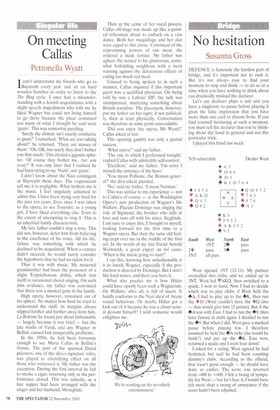On meeting Callas
PetroneIla Wyatt
T can't understand my friends who go to 1Bayreuth every year and sit on hard wooden benches in order to listen to the The Ring cycle. I once had a misunderstanding with a Jewish acquaintance with a slight speech impediment who told me he liked Wagner but could not bring himself to go there because the place contained too many of what I thought he said were 'gnats'. This was somewhat puzzling.
'Surely the climate isn't exactly conducive to gnats?' I remarked. 'What are you talking about?' he returned. 'There are masses of them."Oh. OK, but surely they don't bother you that much.' This elicited a gigantic splutter. 'Of course they bother me. Are you crazy?' It was only later that I realised he had been trying to say 'Nazis', not 'gnats'.
I don't know about the Nazi contingent at Bayreuth these days. The cognoscenti tell me it is negligible. What bothers me is the music. I feel singularly ashamed to admit this. I have been trying very hard for the past ten years. Ever since I was taken to the opera, to see Turandot, as a young girl, I have liked everything else. Even to the extent of attempting to sing it. This is an inherited family characteristic.
My late father couldn't sing a note. This did not, however, deter him from believing in the excellence of his voice. All his life, failure was something with which he declined to be acquainted. When a venture didn't succeed, he would rarely consider the hypothesis that he had no talent for it.
Thus it was with music. My maternal grandmother had been the possessor of a slight Terpsichorean ability, which lent itself to occasional choral singing. On such slim evidence, my father was convinced that there was a musical gene in the family.
High opera, however, remained out of his sphere. No matter how hard he tried to understand the stuff, its margins always slipped further and further away from him. La Bolzeme he found just about fathomable — largely because it was brief — but the late works of Verdi, and any Wagner or Bellini, caused him insuperable problems.
In the 1950s, he had been fortunate enough to see Maria Callas in Bellini's Norma. The part of the spurned Druid priestess, one of the diva's signature roles, was played to electrifying effect on all those who witnessed it. My father was the exception. During the first interval he left to smoke a cigar, returning only as the performance closed. This was unlucky, as a late supper had been arranged with the singer and her husband, Meneghini.
Then at the acme of her vocal powers, Callas off-stage was made up like a painted tribesman about to embark on a rain dance. Both her maquillage and her diet were equal to this chore. Convinced of the rejuvenating powers of raw meat, she ordered a steak tartare. My father was aghast. He turned to his glamorous, somewhat forbidding neighbour with a stern warning against the deleterious effects of eating too much red meat.
Unused to being spoken to in such a manner, Callas inquired if this important guest was a qualified physician. On being told he was a Labour MP, the lady was unimpressed. muttering something about British socialists. The placement, however, put my father on her right; if not politically, then at least physically. Conversation was therefore at some point unavoidable.
'Did you enjoy the opera, Mr Wyatt?' Callas asked at last.
This opening gambit was only a partial success.
'What opera?' said my father.
The one in which I performed tonight,' replied Callas with admirable self-control.
'Excellent,' said my father. 'I'm sorry I missed the entrance of the hero.'
'You mean Pollione, the Roman general?' the diva asked, puzzled.
'No,' said my father. 'I mean Norman.'
This was similar to my experience — not to Callas's of course — at the Washington Opera's new production of Wagner's Die Walkiire, Placido Domingo was singing the role of Sigmund, the brother who falls in love and runs off with his sister, Sieglinde. I am sure to enjoy this, I thought to myself, looking forward for the first time to a Wagner opera. But then the same old feeling crept over me in the middle of the first act. In the words of my late friend Arnold Weinstock, a great expert on be! canto, 'When is the music going to start?'
I say this, knowing how unfashionable it is to knock Wagner. especially if the production is directed by Domingo. But I don't like loud noises, and there you have it.
What also puzzles me is how Hitler could have openly been such a Wagnerian. Die Walkiire, after all, is full of incest. It hardly conforms to the Nazi ideal of Aryan sexual behaviour. Or maybe Hitler got a kick out of it because he was a closet sexual deviant himself? I wish someone would enlighten me.


























































































 Previous page
Previous page